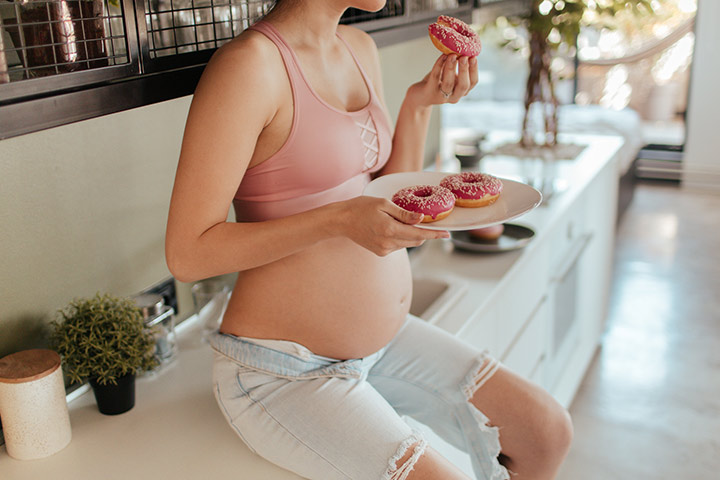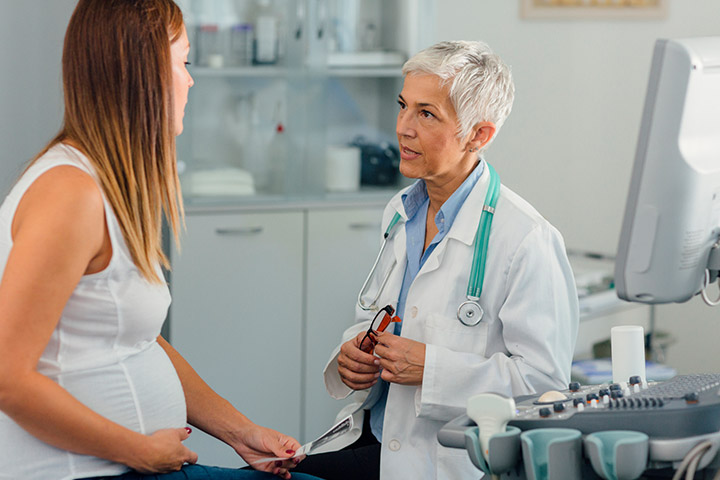
Image: Shutterstock
Pregnancy and motherhood are often painted a pretty picture. The struggles that women face during and after pregnancy are rarely talked about and acknowledged. Pregnancy is a phase when women have to deal with major body changes. The weight gain, the growing belly, stretch marks, loose skin and also the worsening of skin problems. Women find themselves struggling to be confident in their own skin. The emotional stress of being a new mom, starting a family and embracing and accepting the changes that their bodies go through can be quite overwhelming for pregnant women.
It was found that eating disorders affect 7,000,000 women in America every year. And it peaks during pregnancy (1). And the hormonal and body changes can trigger eating disorder relapse in women who wish for a beautiful pregnancy experience (2).
What Are The Risks Of Eating Disorders During Pregnancy?
Eating disorders can pave the way to several risks during pregnancy (3):
Risks for the mother: If a pregnant woman is suffering from disordered eating, it can cause dehydration, poor nutrition, cardiac irregularities, severe depression during her pregnancy, gestational diabetes, labor complications, premature birth, nursing difficulty, and postpartum depression.
Risks for the baby: The baby may be born premature, have low birth rate, poor development, respiratory distress, and feeding difficulties. He/she may also suffer from other perinatal complications.
If a pregnant woman suffers from anorexia nervosa, she may be underweight. She won’t be able to put on enough weight during their pregnancy. The baby may also be at a higher risk of having abnormally low birth weight and may also suffer from the health problems that come along with it.
In the case of women with bulimia nervosa, they may suffer from dehydration, cardiac irregularities, or dehydration. These health risks are heightened during pregnancy.
And women with binge eating disorder can gain more weight which can put them at a greater risk of developing gestational diabetes and high blood pressure.
What Can Be Done?
It doesn’t matter if you are trying to conceive, have already become pregnant or a new mom, you can always turn things around. The majority of women who are suffering from eating disorders can give birth to a normal healthy baby if they are able to maintain normal weight gain throughout their pregnancy. If you are somebody who is suffering or suffered from an eating disorder, these guidelines may help (4).
If you are trying to conceive:
- Try to maintain a healthy weight
- Avoid purging
- Book an appointment with your doctor for a pre-conception consult
- Talk to a nutritionist and start following a healthy pregnancy diet
- Seek counseling if you have any concerns and also to address your issue
If you are pregnant:
- Eat nutritious meals
- Schedule a prenatal visit to address all your concerns
- Avoid purging
- Maintain a healthy weight
- Seek counseling if you have any concerns and also to address your issue
If you are a new mom:
- Continue to go for counseling
- Get help from your doctor, partner and friends post delivery as there’s a higher risk of postpartum depression
- Find a good nutritionist who can help you maintain a healthy lifestyle, and also invest in your little one
- You can also contact a lactation consultant to help with breastfeeding your baby
The constant comparing, counting, and measuring everything that goes into your body during your pregnancy or post-delivery days can tap into your own vulnerabilities and may make you obsess over your food and weight. And that’s why it’s important to know that there is no shame in asking for help. Getting all the help and support that you may need will help you ride through the storm without suffering a relapse. Learn to celebrate your body and all the work it has done to get to where you are today. You will slowly learn to embrace your stretch marks and loose skin and break out of the cycle of body hatred.















